English Edition
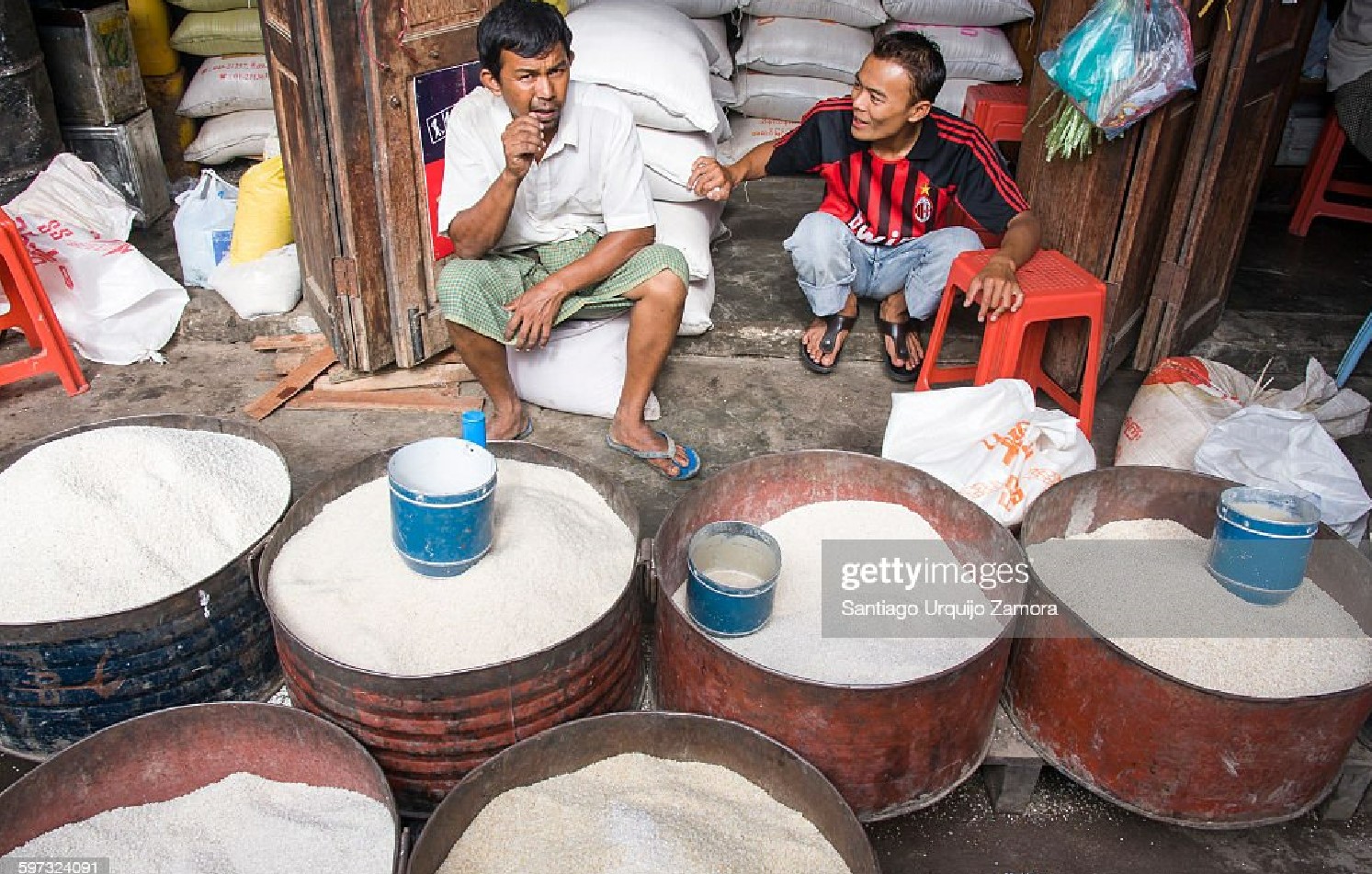
- By CNI
- Category: English Section
- Hits: 855
CNI News
17 Mar 2023
The new rice law should not impose restrictions on farmers, according to them.
The State Administration Council has issued the draft of the new rice law for the domestic sufficiency of rice and systematic exports.
Although the law was drafted for systematic exports of rice, it is important that the law does not create side effects for farmers and restrictions on rice exports are likely to have an impact on farmers, Chairman U Thein Aung of the Farmer Development Association told the CNI.
He said, "They said the rice law aims to regulate rice exports and to take action against tax evasion from rice exports. However, the law should not impose unnecessary restrictions on farmers. If the law was drafted with good aims without affecting outputs, the ministry should enact the law. We have always urged authorities not to restrict farmers. We cannot tell them not to enact laws but we will have to talk about the consequences of laws, rules and policies. We will have to think about whether the laws impose restrictions on farmers. However, we will get higher paddy prices when rice can be exported."
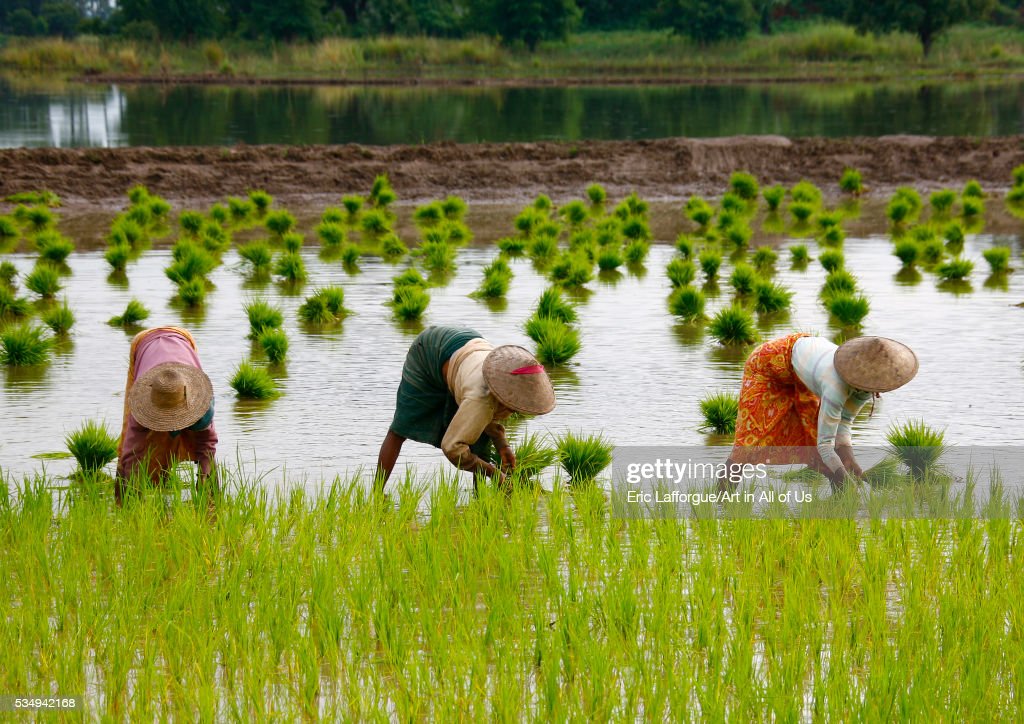
Farmers.
Although it is necessary to enact the rice law, the government should focus on issues encountered by farmers such as reduction of high costs of inputs, fuel and commodities, according to farmers.
As the draft law stipulates that a reserve rice purchasing committee shall be formed, it is important to purchase and resell reserve rice after considering the harvesting season and prices in the market, according to farmers and rice merchants.
Only then, will it be fair for farmers and consumers, they added.
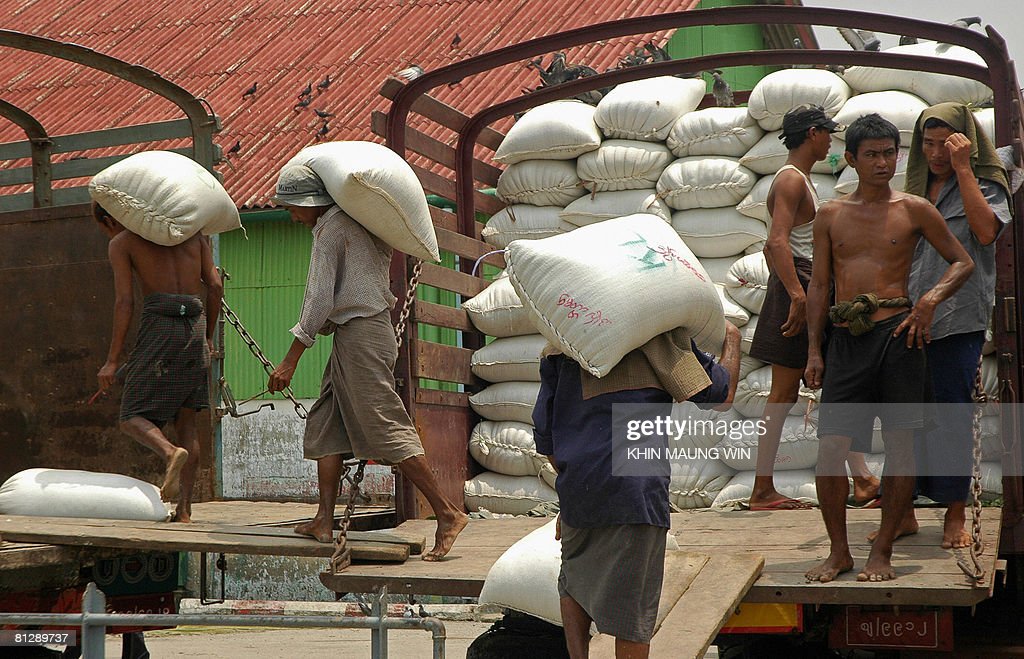
Loading rice.
The draft law also says that reserve rice will be resold when rice prices are very high. However, it is necessary to resell reserve rice at reasonable prices and rice exports will not be affected by the law, an official from the Myanmar Rice Merchants Association told the CNI.
He said, "We need a rice law. Merchants want to export rice without restrictions. However, they should be fair. The law aims to control the market with reserve rice when rice prices rise significantly. They will monitor rice milling and trading. Prices should be reasonable in the market. It will not have an impact on rice exports. Exchange rates will have impacts on small exporters."
The draft law has 10 chapters and 51 provisions and regulates rice exports, taxation on rice mills, storage and production of quality rice.
If the draft law imposes restrictions on the market, the rice industry will come to a halt and farmers are likely to reduce cultivation acreage, farmers said.
The draft law is under discussion in Yangon and Pathein and plans are underway to hold discussions over the draft law in major rice cultivation areas including Nay Pyi Taw and Mandalay from March to early April, according to the Myanmar Rice Federation.
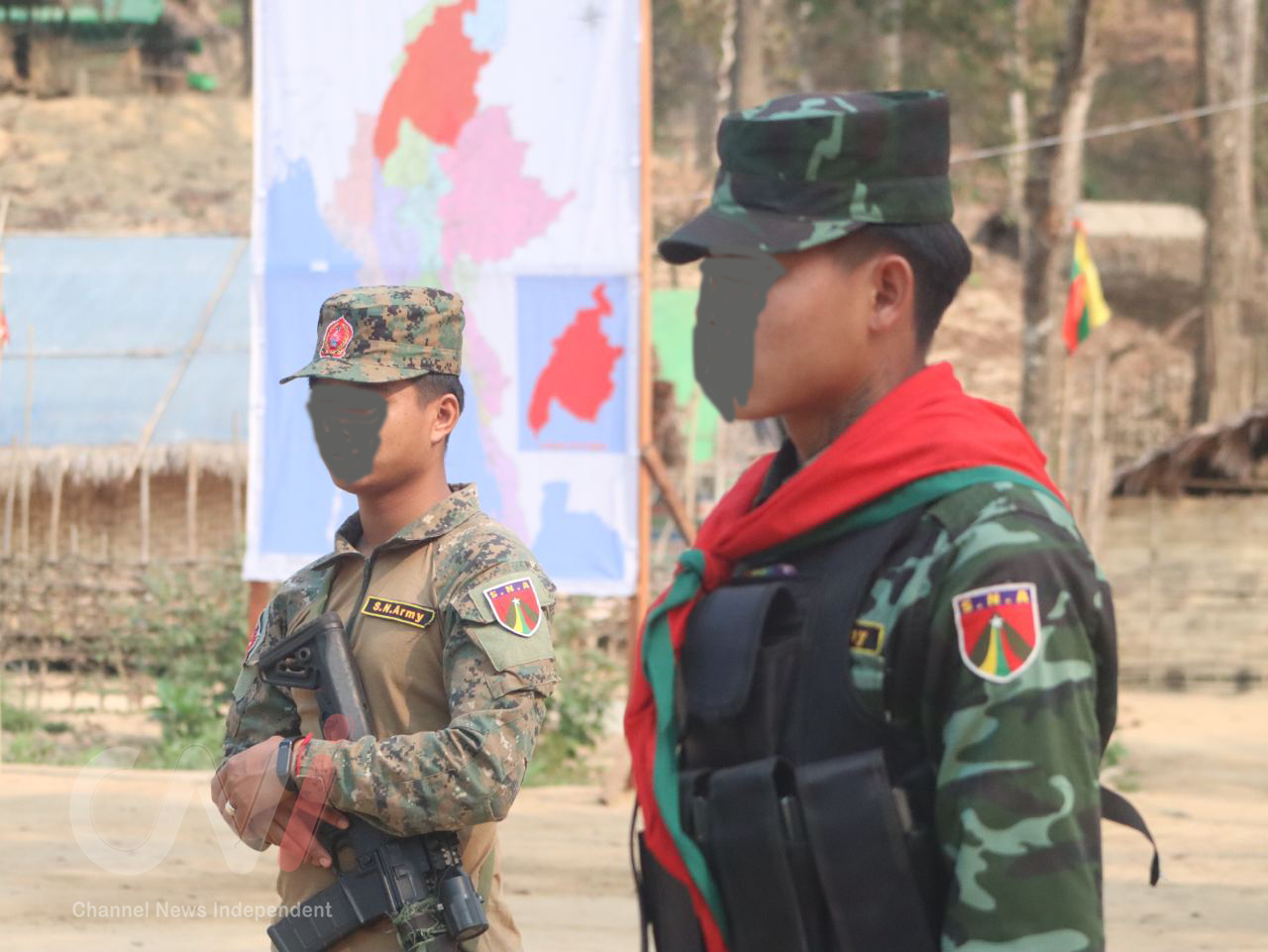
- By CNI
- Category: English Section
- Hits: 788
CNI News
17 Mar 2023
Brig-Gen Say Sai Tun of the Shanni National Army has warned the Shanni people against attempts to cause disintegration and demise of them.
He made the comment in his speech on Shanni National Day ceremony held at an area controlled by the SNA on 13th March 2023.
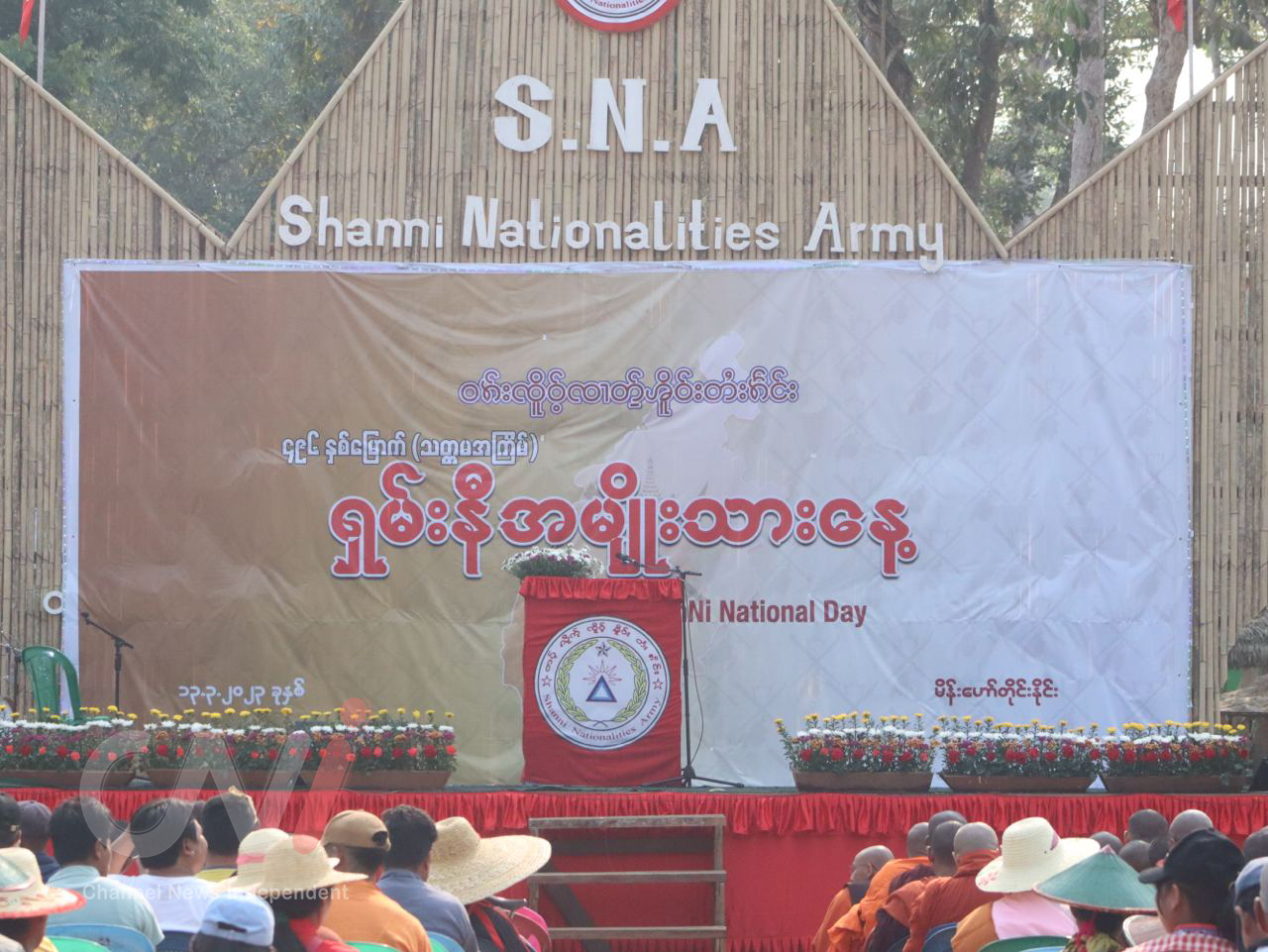
A Shanni National Day ceremony.
He said, "At the same time, I would like to urge all on this occasion not to waste time by reminiscing glories of the past. At present, the Shanni people have come under attack from all sides and encounter hardship. Therefore, it is necessary for the people to be united and I would like to reiterate that the SNA will stand firmly together with the people in defence of them. At a time like this, the Shanni people and the SNA are required to stand back to back in unison. We will have to move forward until our goals have been achieved. We should be aware of the incitement of those who want to create divisions among us."
Amid the Myanmar political crisis, political, military and economic hardship and armed conflicts have erupted in areas resided by Shanni people.
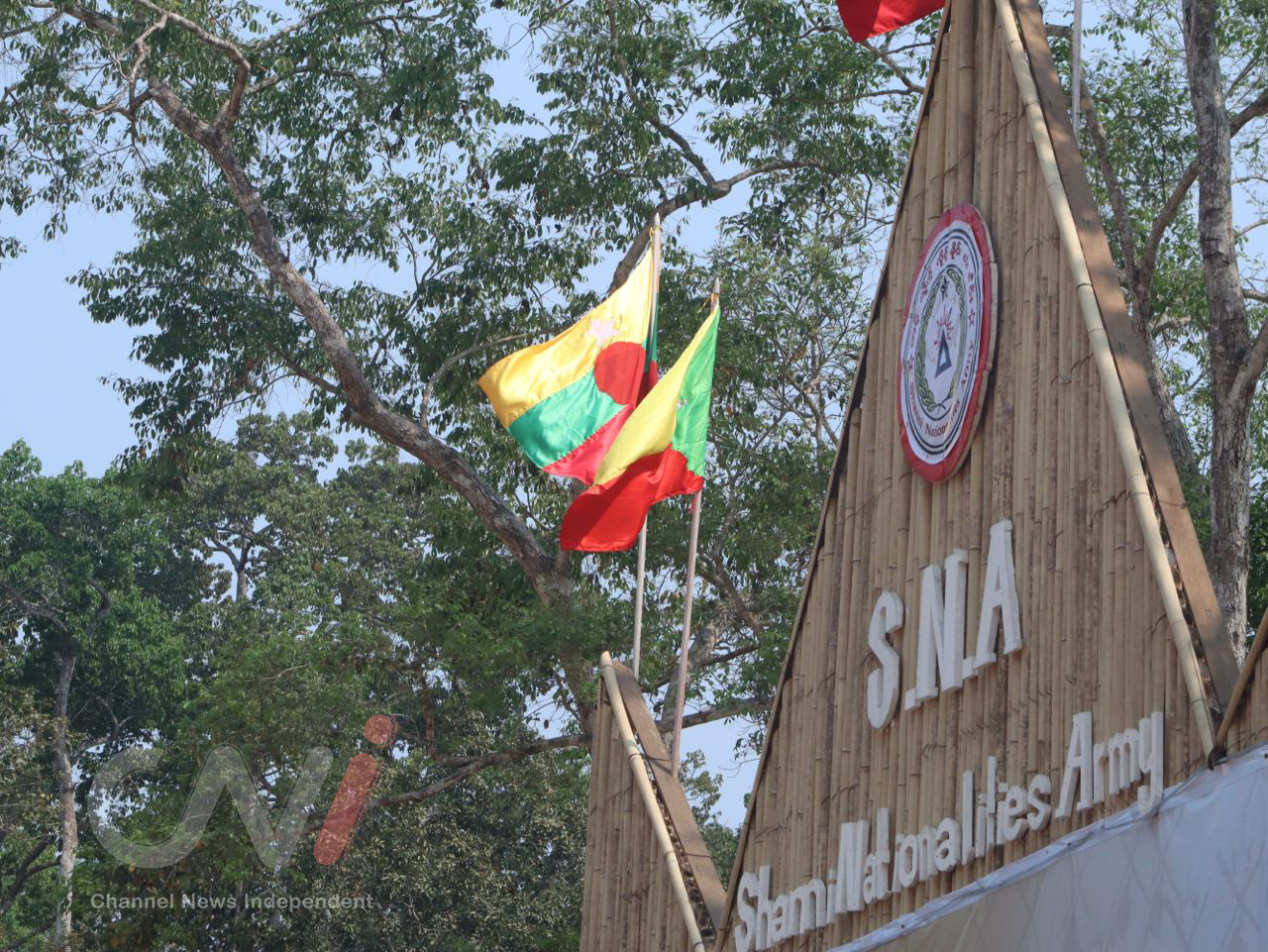
Areas controlled by the SNA.
As Shanni King Tho Han Bwa was assassinated, the Shanni people were not able to build a united force. However, they have been able to establish the Shanni National Army, the commander of SNA Brigade 753 said.
He said, "Leaders have been trying to build unity without success in successive eras. The attempts have resulted in a unified force at the times of us. In retrospect of the past, after the assassination of King Tho Han Bwa, the Shanni people were not able to build a united force. Now, the SNA, a united national force and army, has been established."
The SNA is active in Hkamti, Homalin, Phaung Pyin, Pinlebu, Wuntho and Banmauk townships in Sagaing Region, along the Indo-Myanmar border and in Mohnyin and Mokaung in Kachin State.
The SNA is an ethnic armed organization aiming at the formation of a Shanni State by integrating Homalin District, Mawlike District, Kalay District, Hkamti District, Kathar District and Tamu District in Sagaing Region and Bhamo District, Myitkyina District, Mohnyin District and Mokaung.
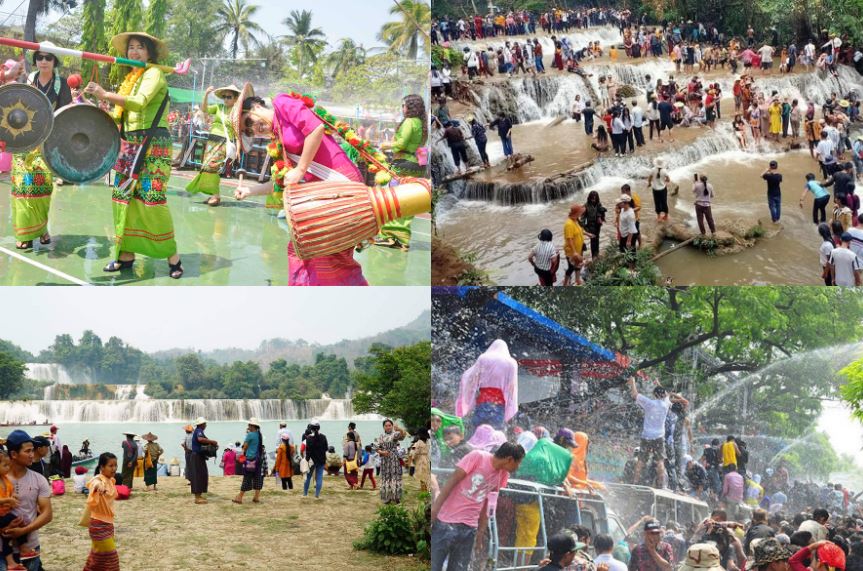
- By CNI
- Category: English Section
- Hits: 734
CNI News
17 Mar 2023
A large number of bookings have been made by domestic travelers at hotels in Shan State for the upcoming Thingyan Festival, the Ministry of hotels and tourism in Shan State and hoteliers told the CNI.
Hotels in Kalaw, Taunggyi, Kyaukme, Lashio, Muse and Laukkai have recently received bookings while some large hotels have been fully booked, according to them.
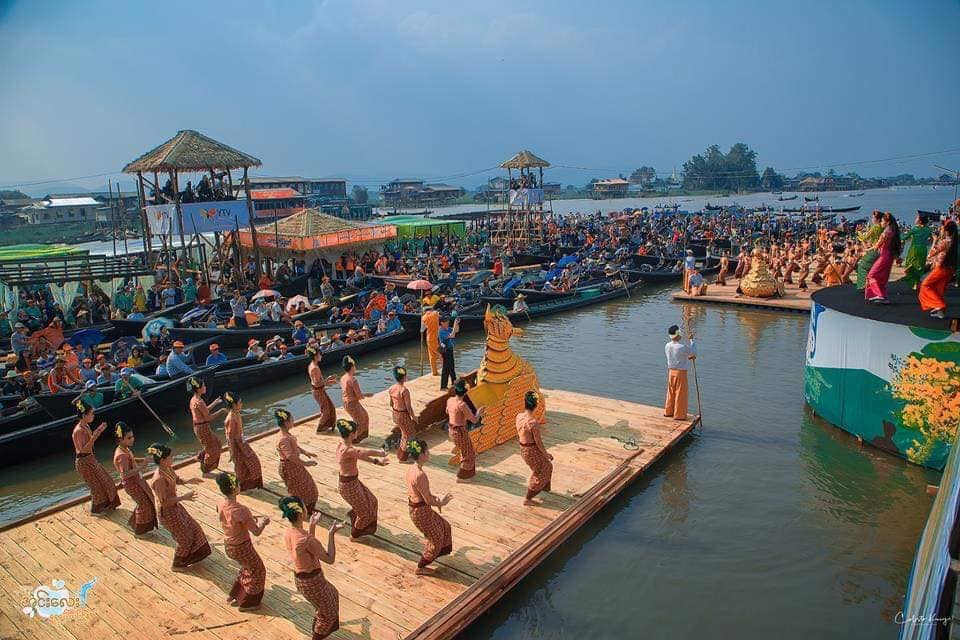
A floating water festival in Nyaungshwe-Inlay in Shan State (South).
Chairman U Zaw Zaw of the Shan State (North) Hoteliers Association told the CNI, "Most of them are coming to Shan State for Thingyan Festival. There are also some businessmen who visit Shan State to study economic opportunities during their holidays as they heard businesses thrive in Shan State. As demand exceeds supply, they have to book hotel rooms in advance. Otherwise, they will encounter difficulties. In the past, no one booked rooms in advance. However, there were visitors during Thingyan Festival. Last year, there were only a few visitors on the first and second days of the festival but the number of them increased later. Now, they are making bookings in advance."
In the 2022 Thingyan Festival, only about 5,000 travelers visited Shan State (North) and it is expected that more people will visit northern Shan State this year.
Authorities are planning to build pavilions, walking water festivals and other arrangements for the festival, Deputy Director U Sithu Kyaw of Shan State Hotels and Tourism Department told the CNI.

A floating water festival in Nyaungshwe-Inlay in Shan State (South).
He said, "We will have to wait and see the situation this year because it was said that plans were underway to organize floating water festival in Inlay in Nyaungshwe and to build pavilions in Taunggyi. When the plans are publicly announced, there will be changes. If other activities are also added, the situation will change. It was said that authorities were planning to organize the festival on a grand scale. I am not certain about the arrangements. However, hotels with good image and reputation have been fully booked. We are thinking about attracting overnight visitors to Nyaungshwe. "
Hoteliers are required to provide better services and security measures for their guests during the festival.
Hotels at beaches have also been fully booked for the festival while hotels Bagan have received many bookings.
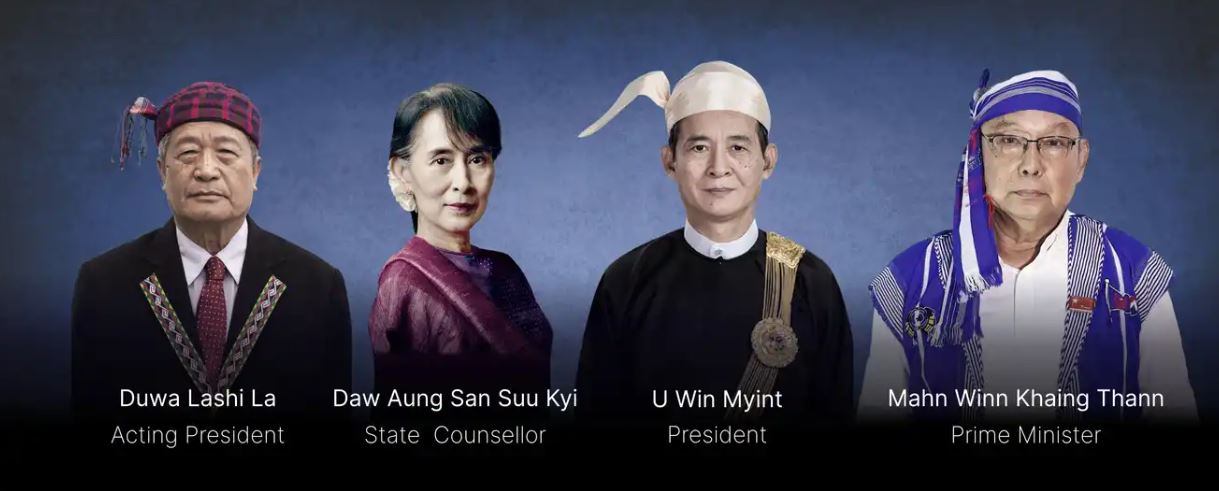
- By CNI
- Category: English Section
- Hits: 712
CNI News
17 Mar 2023
The National Unity Government has not done enough for Myanmar migrant workers, Myanmar labour activists who have been helping them told the CNI.
Labour Activist Ko Thar Gyi from Thailand told the CNI that the NUG should make further efforts to offer effective assistance for migrant workers and to be recognized as a legitimate government by Thailand.
He told the CNI, "To be frank, the NUG is very weak in offering assistance to Myanmar migrant workers. Its performance is unsatisfactroy. As the government has to carry out tasks in multiple sectors, it is very difficult for the NUG to tackle labour issues, a field in which they are not competent. The minister, the deputy minister, the director-general and staff of the NUG labour ministry are very incompetent in offering assistance to migrant workers. I am talking about the situation on the ground."
However, he said that he had seen NUG labour officials holding negotiations with their Thai counterparts several times over the issues of Myanmar migrant workers.

Myanmar migrant workers in Thailand.
As South Korea is a country respecting human rights, centres and NGOs offer assistance to solve the issues of migrant workers, In-charge Ko Khant Nay Kyi of the Assistance Centre for Migrant Workers in Busan told the CNI.
He said, "There are government-funded labour protection centres in every town in South Korea. They offer assistance to solve the issues of migrant workers including wages, physical abuses, changing jobs and healthcare insurance. The Myanmar embassy never offers assistance to Myanmar workers. As the centres and NGOs are offering assistance, the junta embassy or the NUG ministry are not likely to cooperate with us significantly.
However, he admitted that he sometimes has to cooperate with the embassy and the NUG labour ministry is also offering assistance in some cases.
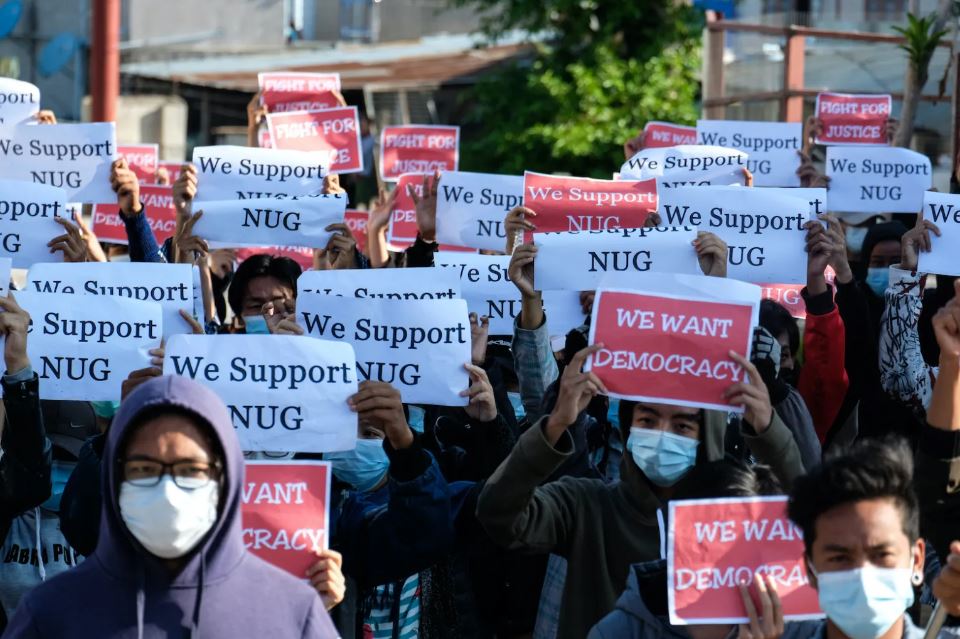
Supporters of the NUG.
To effectively offer assistance to Migrant workers, the NUG needs to replace all people from the labour ministry with new ones, Ko Thar Gyi added.
He said, "All staff the NUG labour ministry has sent to Thailand for migrant workers should be replaced with competent one because it is a country with the largest number of Myanmar migrant workers. I am saying so not out of prejudice. We will have to solve the problem by using whatever means we have. The government elected by us should be far-sighted and know the situation on the ground case by case. It should employ staff who are competent."
Large numbers of Myanmar migrant workers are leaving the country due to economic and wage issues.
Most of them have left for Thailand, Malaysia, South Korea and Japan while many more are applying for passports to leave the country.
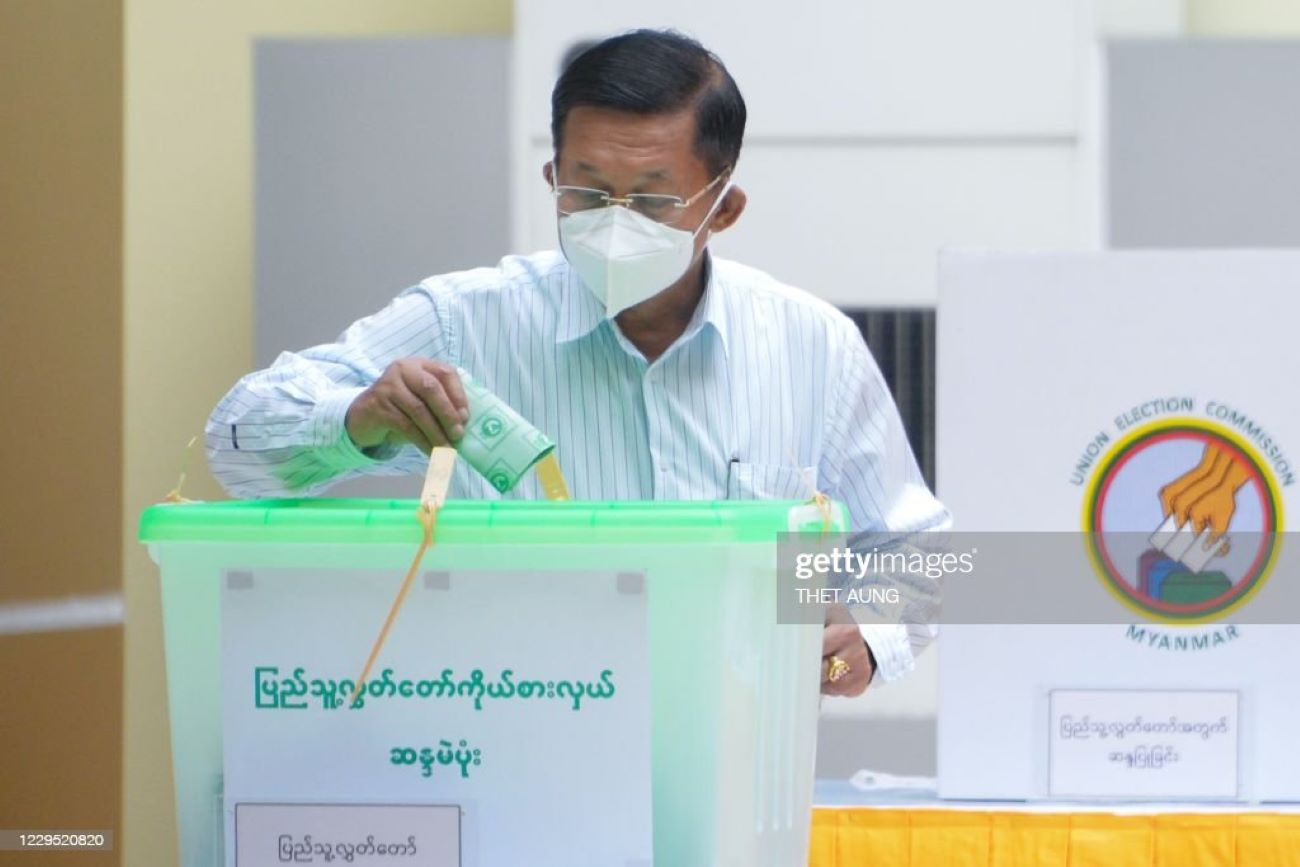
- By CNI
- Category: English Section
- Hits: 726
CNI News
17 Mar 2023
Although the chairman of the State Administration Council said power would be transferred to the winning party in the upcoming elections, political parties are divided over the credibility of the claim.
SAC Chairman Snr Gen Min Aung Hlaing promised to hold a general election and to transfer power to the winning party.
As there are only a few political parties that are registered to take part in elections in the entire country under the new political parties registration law and its new rules and the Union Solidarity and Development Party is likely to win the elections, the SAC would transfer power to the USDP, Spokesperson Naing Than Shwe of the Mon Unity Party told the CNI.
He said, "Under the curent circumstances, there are only a few political parties that will take part in elections in the entire country. The USDP and the NUP will run for election in the entire country. The NLD said it would not re-register with the commission. Other parties including the NUP will win in only a few constituencies. The USDP will win in most constituencies. So, the SAC will transfer power to the USDP."
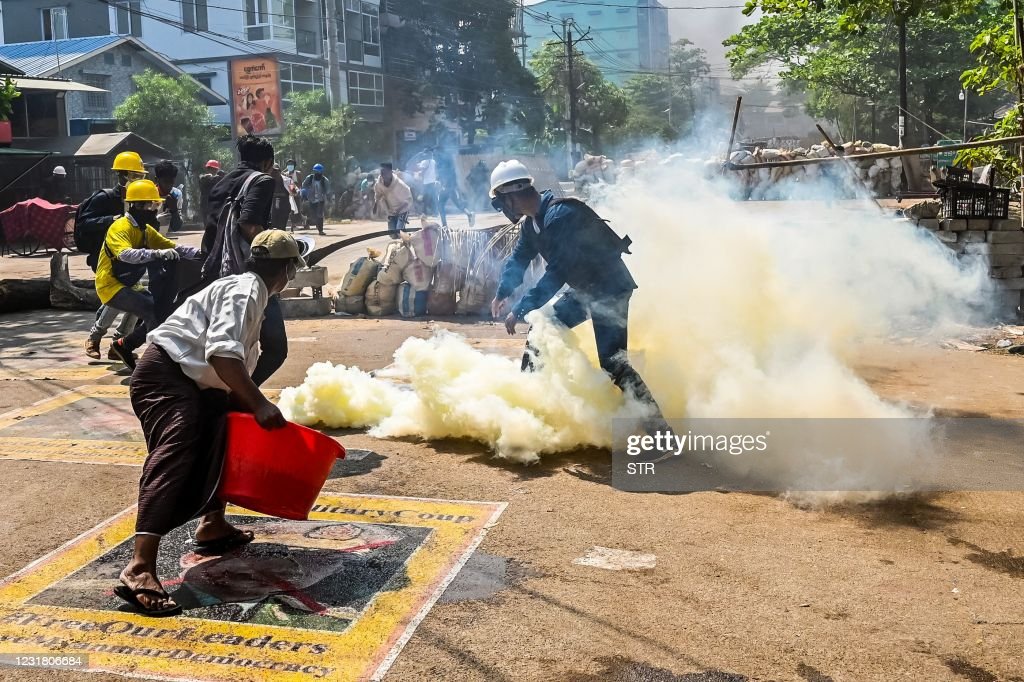
A demonstration calling for democracy.
Despite the pledge of the SAC chairman, a leader from an influential political party said he was doubtful about the promise because the military has a history of failure to honor its promises in the 1990 elections.
As the SAC has publicly vowed to transfer power to the winning party, he believes that the military will keep its promise, Chairman Sai Aik Paung of the Shan and Nationalities Democratic Party told the CNI.
He said,"The SAC has already promised to transfer power to the winning party, which will be elected to convene the parliament and to elect a president and form the government. After the formation of the new government, the SAC will transfer power to it on 1st November or April. I think so. I hope so."
The Union Election Commission has been preparing to hold elections in 2023 and has been inviting new political parties to rregister with it by issuing the new political parties registration law and its rules on 31st January.
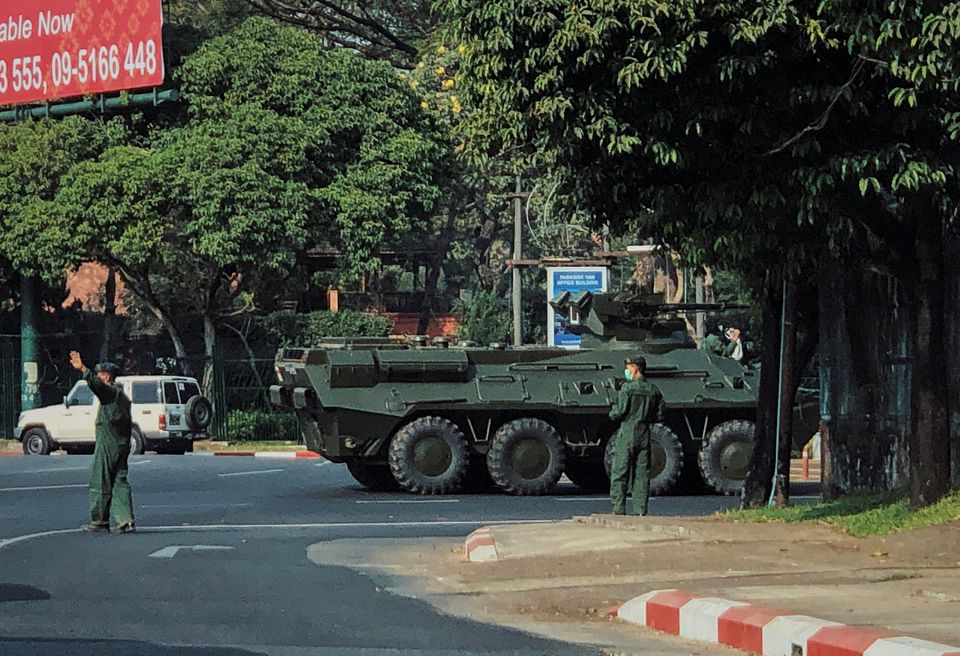
A military vehicle patrolling along streets after the NLD government was toppled.
A total of 23 political parties including five parties that will take part in elections in the entire country have registered with the commission so far, according to a statement of the commission on 14 March.
Some political parties are still thinking about whether to take part in elections or not.
However, the National Unity Government has vowed to disrupt the elections scheduled by the SAC.
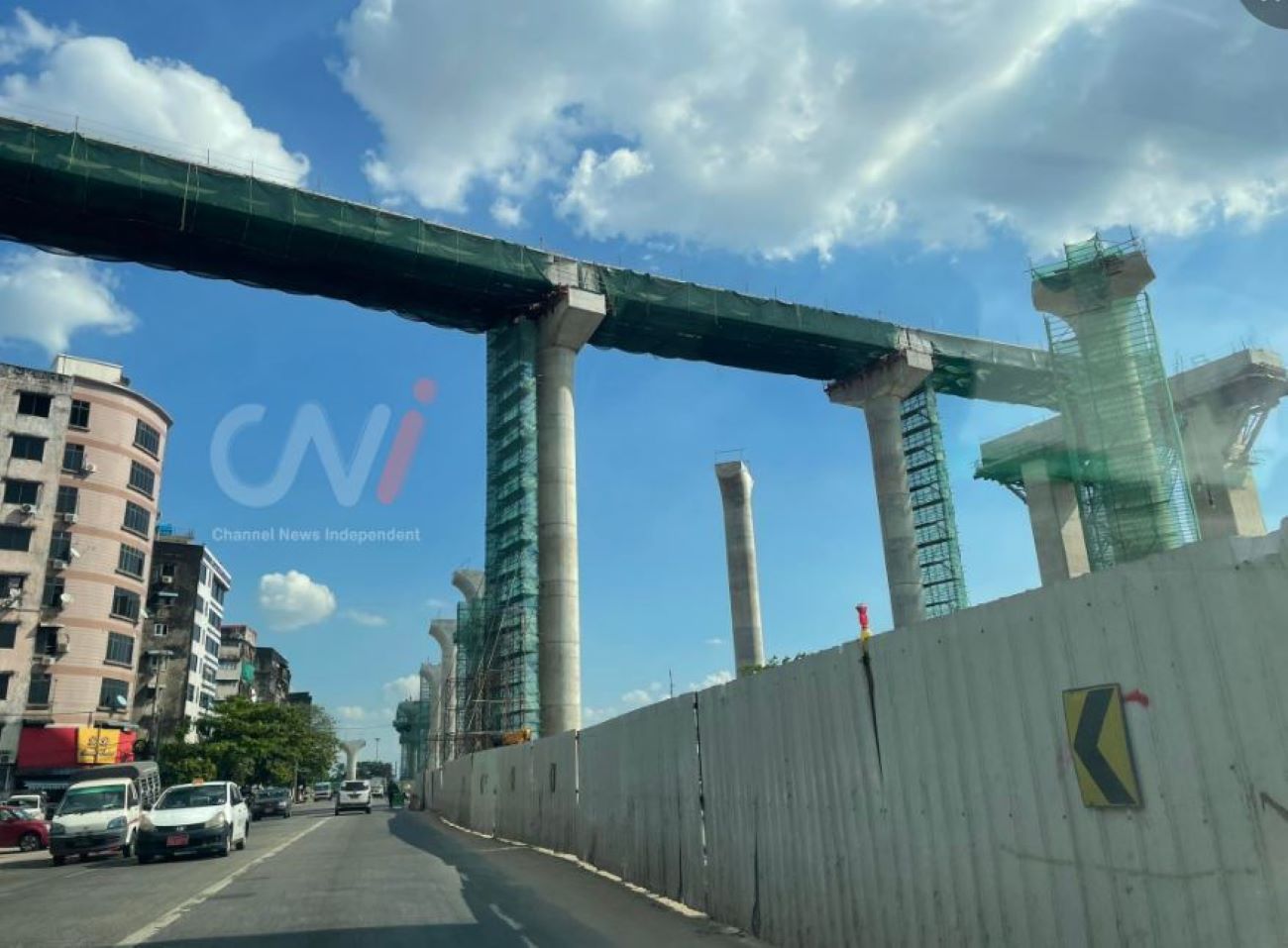
- By CNI
- Category: English Section
- Hits: 1379
CNI News
17 Mar 2023
As more than 50 percent of the construction of Dala bridge known as Korea-Myanmar Friendship Bridge has been completed, the demand for properties in Dala Township has increased and real estate prices have skyrocketed, according to residents and property agencies.
Thanks to the bridge construction project, the demand for land plots have grown and property prices have increased month by month. The prices of land plots, which were sold at MMK 80 million per plot previously, have risen to MMK 150 million currently, Ko Min Min of MKTT Property Services told the CNI.
Ko Min Min said, "Depending on the percentage of completion of the bridge, people are interested in buying land plots in Dala. More than 50 percent of the construction of the bridge in Yangon have been completed. Another reason is the depreciation of Kyat. So, some people have invested in land plots. The demand for land in Dala has grown. Land prices have increased day by day. Land prices are rising by millions of MMK within one month. As a result, more people are interested in buying land plots in Dala. In the past, the price of a 20x60 land plot stood at MMK 80 million. At present, the price of such a land plot has risen to MMK 150 million within one month."

A scene in Dala.
The demand for land plots near the bridge in busy Tapinshwehti Ward and Kyansittha Ward are in high demand.
The property market has been booming since the beginning of the year and residents are selling their land plots as they fetch high prices and moving to other wards where land is available at cheaper prices. As a result, business is brisk in the property market, U Aye Win, ward administrator of Yazathingyan Ward in Dala, told the CNI.
He said, "Business is brisk in the property market. The demand for land plots is growing. Dala have developed to some extent. So, some people are buying land. Local residents are selling their land plots and moving to places where land is available at cheaper prices as they need money for investment in their businesses and other expenses. Therefore, land prices have risen in the market since the beginning of the year.
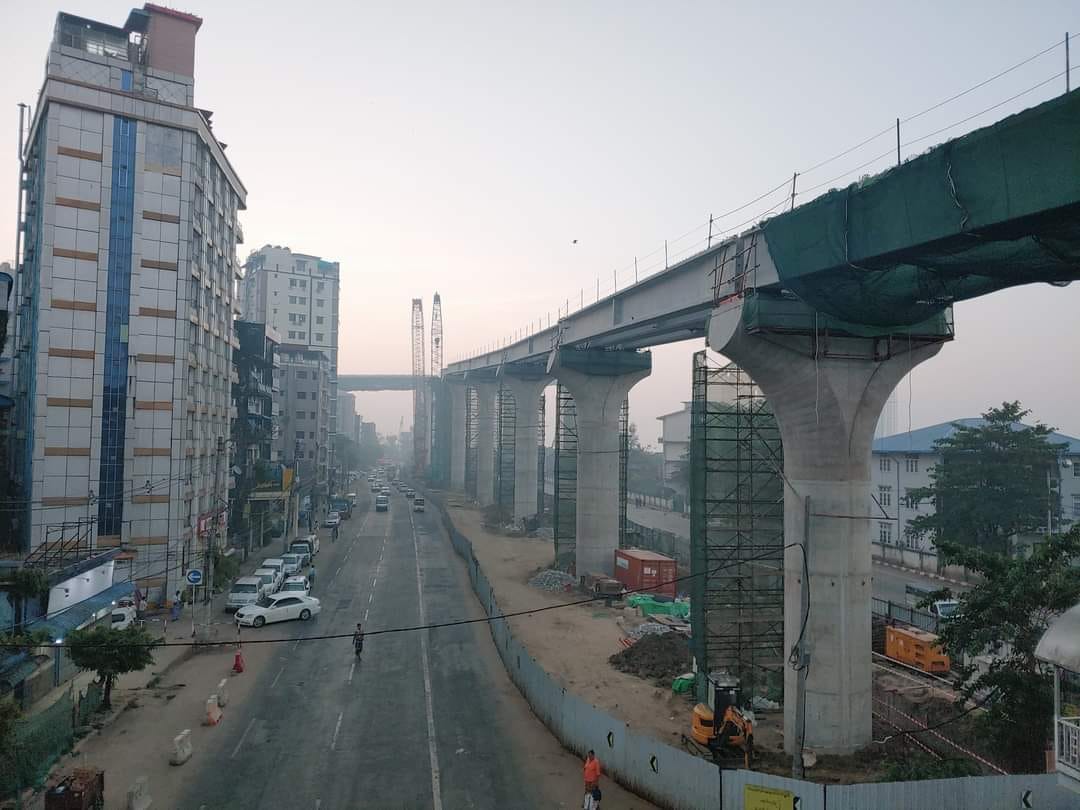
Yangon-Dala bridge under construction.
So far, 53 percent of the construction of the bridge has been completed and the bridge is scheduled to complete in 2024, according to the Ministry of Construction.
With the construction of the bridge, plans are underway to supply water from Gyuphyu Reservoir to Dala to solve the issue of water shortages in Dala, according to residents.
Residents and property services have expected the demand for real estates in Dala will be higher after the issue has been solved.
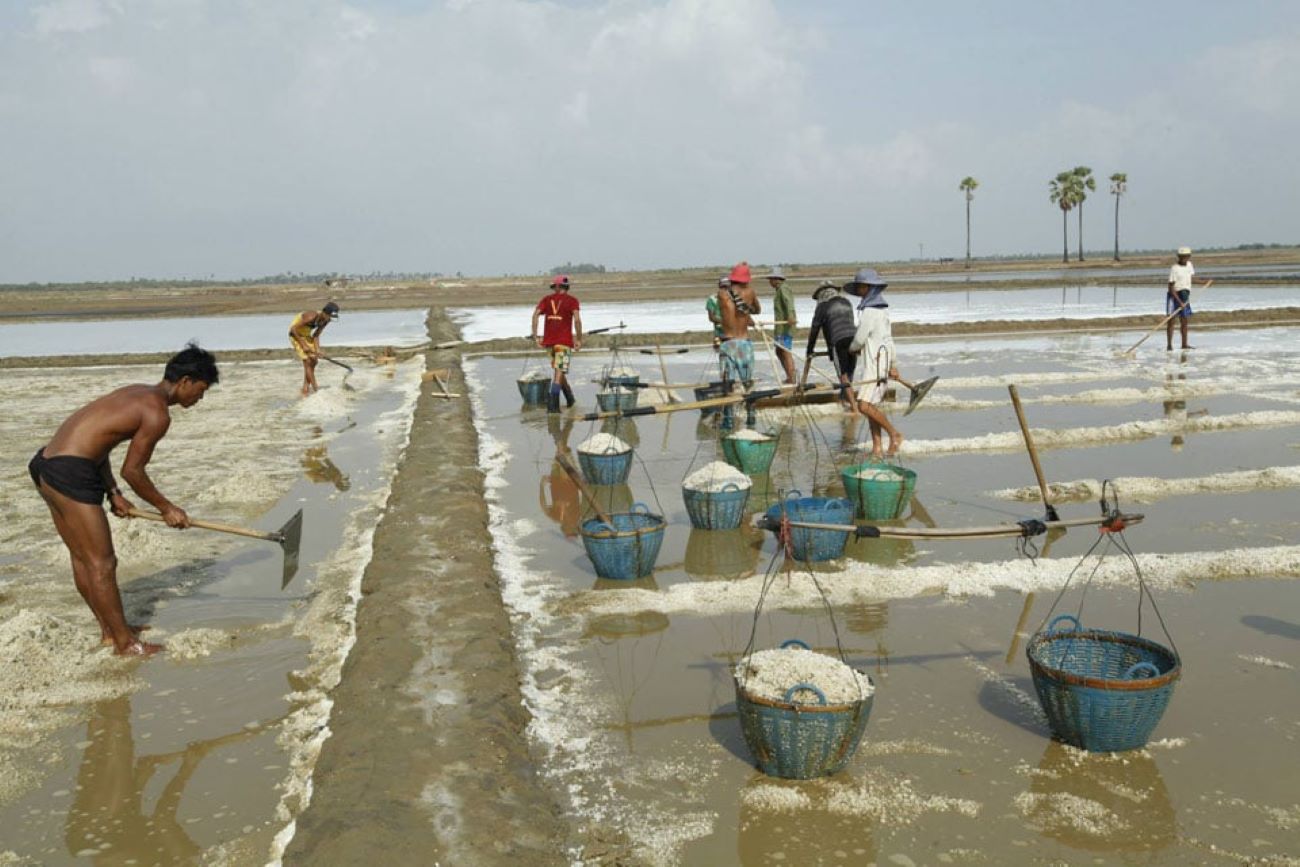
- By CNI
- Category: English Section
- Hits: 783
CNI News
16 Mar 2023
Due to unseasonal rains and strong winds, salt farms in Mon State have suffered huge losses, according to salt farmers.
Unexpected rains on 12th March night caused rainwater to flow into salt farms and salt on them was damaged.
Although rain was predicted, farmers were not able to move them due to labour shortages, resulting in losses, U Hla Tin, a salt farmer from Thanbyuzayat Township in Mon State told the CNI.
He told the CNI, " Heavy rains in our areas destroyed 50,000 visses of salt. Some farmers were aware of the unseasonal rains but others were not. We harvested salt but it was difficult for us to do so because of labour shortages. As a result, half of my salt farm was damaged by the rains."
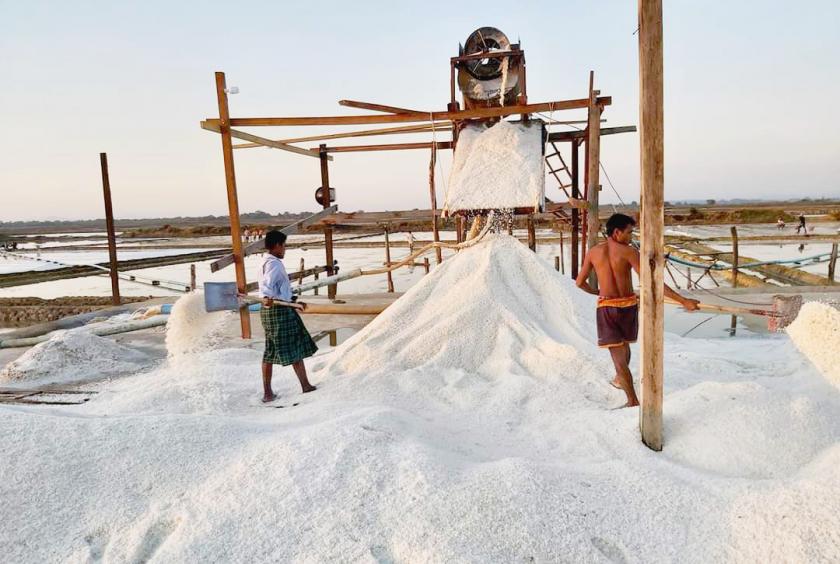
A salt farm
It will take 15 to 20 days to recover damaged salt and each salt farm lost salt worth about MMK 10 million, according to salt farmers.
It rained unseasonally three times in Mon State during this salt producing season but farmers did not suffer losses in the two previous unseasonal rains. However, most salt farmers suffered losses in the last unseasonal rains, according to salt farmers.
As salt was damaged by rains, salt prices in the market have risen from MMK 120 to 170 per viss, a salt farmer told the CNI.
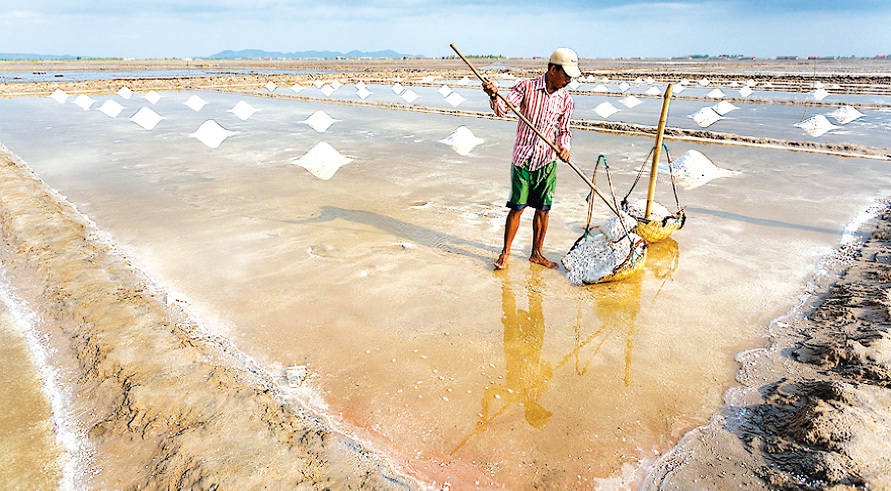
A salt farm
He said, "As salt production has dropped, prices have increased. At higher prices from MMK 170 to 200 per viss, it is profitable for merchants as well as farmers."
There are 4,200 acres of salt farms in Mon State and more than 400,000 tons of salt is produced from the farms. However, only about 200,000 tons of salt was produced in Mon State due to unseasonal rains.
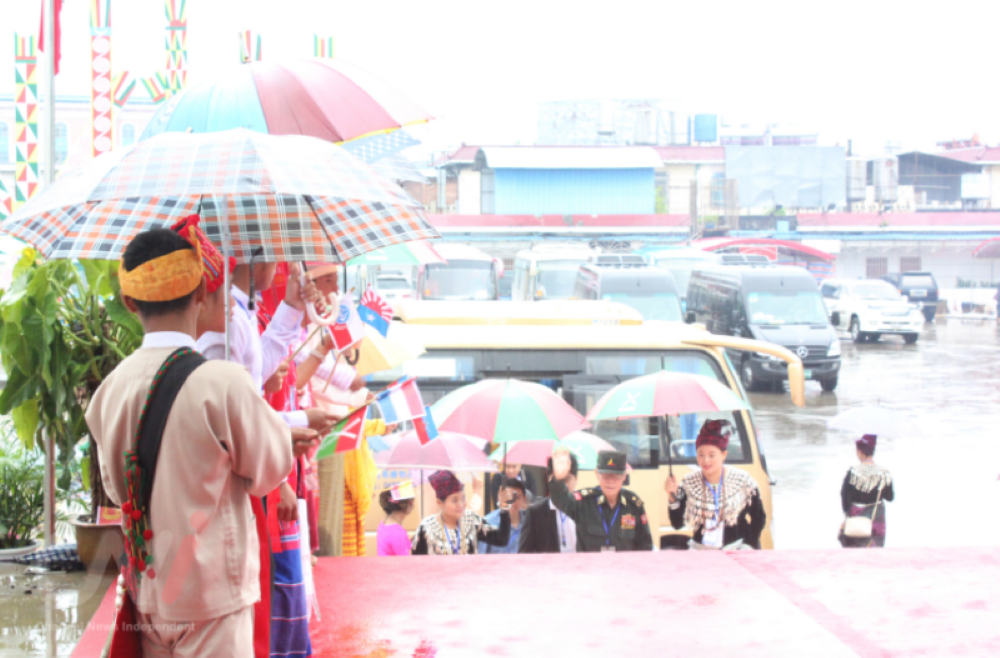
- By CNI
- Category: English Section
- Hits: 718
CNI News
16 Mar 2023
Attempts to create a Bamar State is likely to create risks and disintegration of the union, Political Observer U Ye Tun told the CNI.
If Bamar State is to be established, some other ethnic minorities are likely to demand establishment states for them, he added.
He told the CNI, "It is dangerous to establish a Bamar State. Some minorities in some states are likely to call for the establishment their own states, leading to the disintegration of the union. So, leaders and politicians are required to understand the situation."
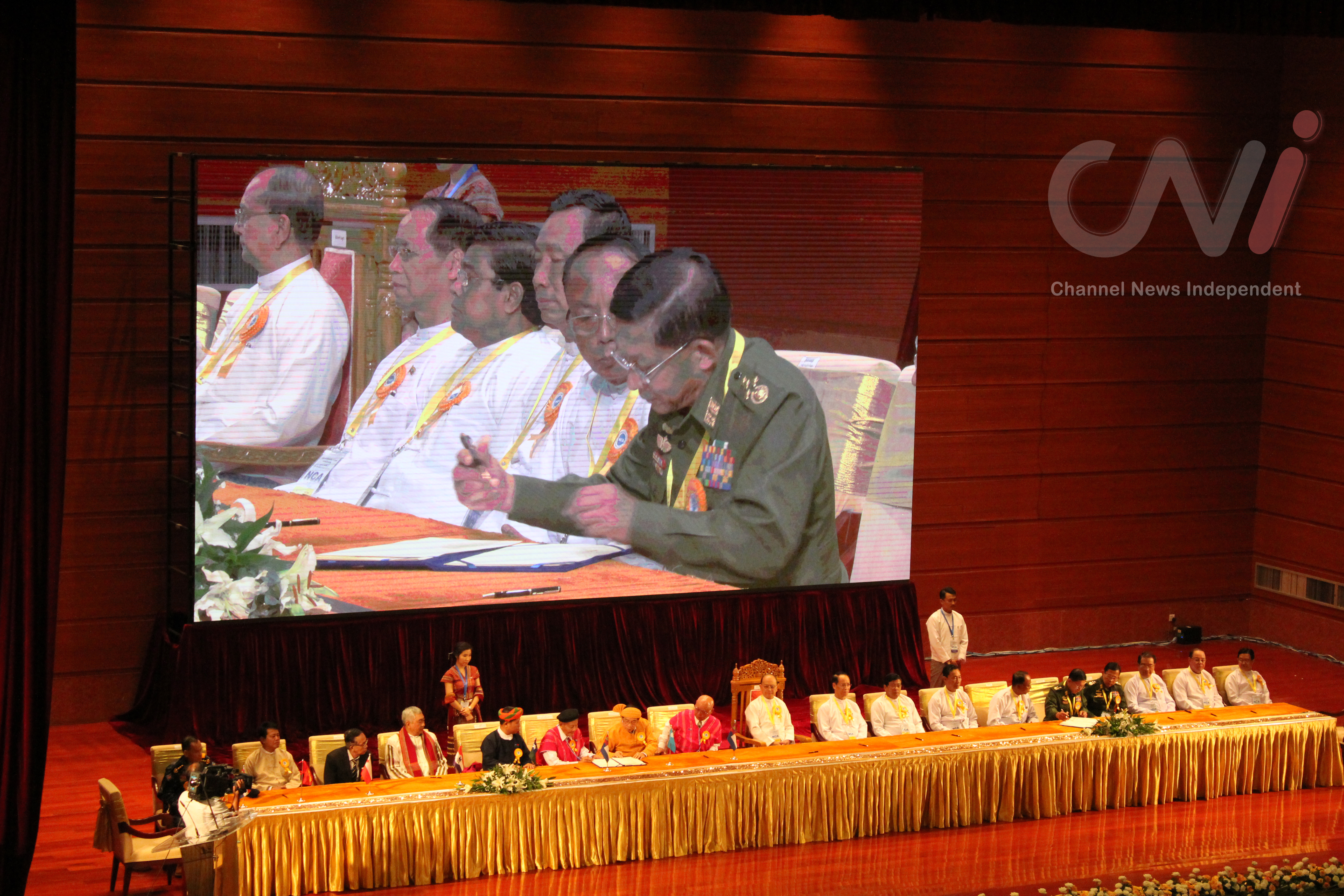
Ethnic youths in Maijaryan in July, 2016.
On the 76th Anniversary of Union Day, which fell on 12th February, Representative Lawy Poe Nge said that it was important to establish a Bamar State for ethnic equality.
During peace talks with ethnic armed organizations in 2022, the State Administration Council seemed to disagree with EAOs, which proposed the establishment of a Bamar State.
To build a federal union in the future, it is necessary to establish a Bamar State and symbols representing the Bamar people, Rakhine Politician U Pe Than told the CNI.
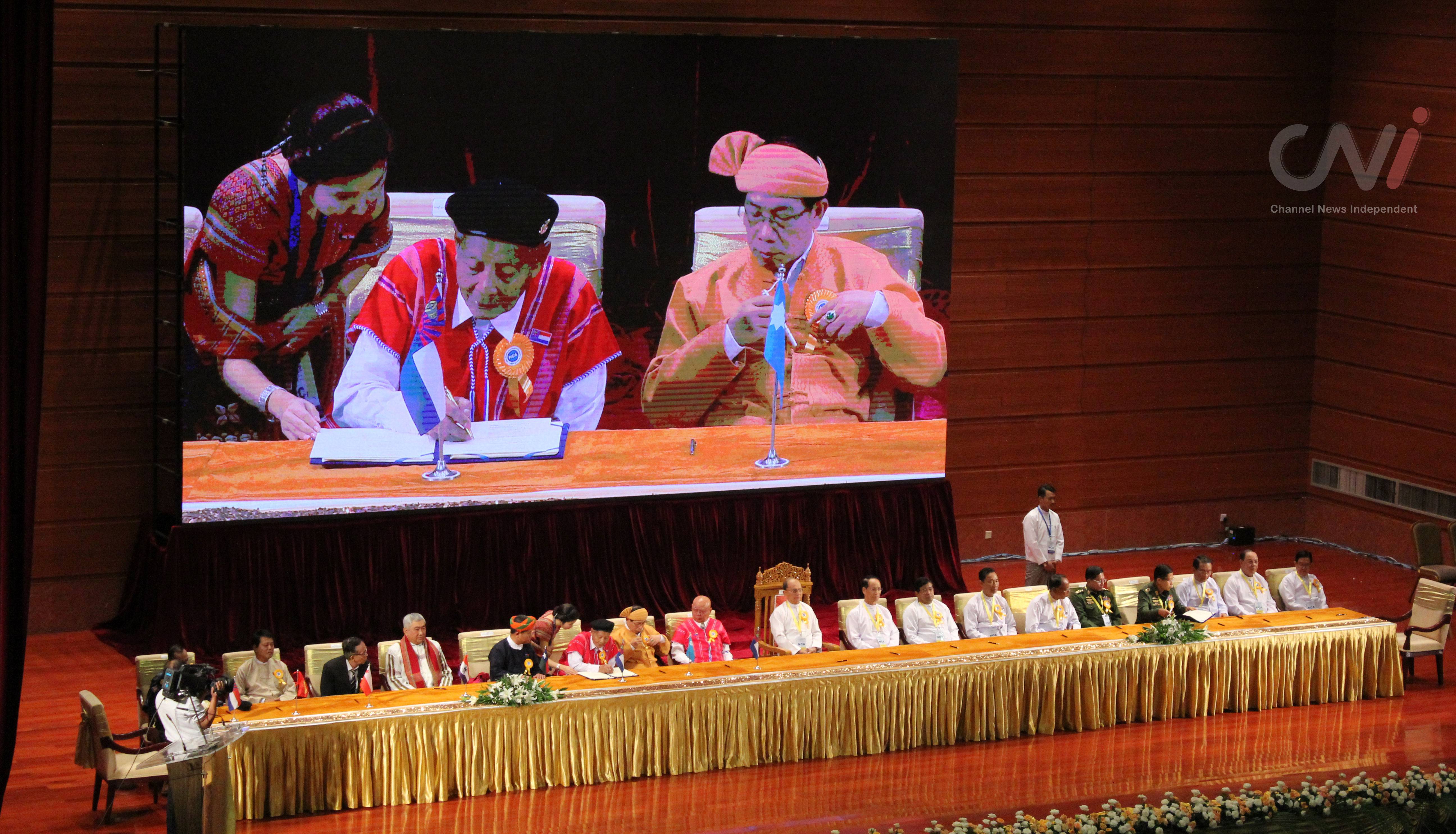
Representatives of EAOs sign the Nationwide Ceasefire Agreement on 15 October, 2015.
U Pe Than told the CNI, "In federal countries, regardless of their sizes, all states are considered as a unit. If they don't want to establish a Bamar State, it shows that they have the mentality of rulers. Bamar politicians and generals have had such a mentality in successive eras. Whenever other ethnic groups call for establishing a Bamar State, they have always said that will lead to disintegration of the union. This has nothing to do with the size of a state. It will be just a federal unit. Seven regions are likely to make up a Bamar State. However, we said some regions like Yangon Region are national states because all ethnic groups reside in the region at the parliament. If there is not a Bamar State, characteristics of a union will not be achieved because there is a Bamar State. When flags are flown in regions, they raise the union flags. There is no such thing as a flag or a symbol representing the Bamar ethnic group. Bamar leaders and politicians are using the national flag as their own flag."
At the same time as some ethnic groups are calling for the establishment of a Bamar State, some minority groups including the Shanni, the Pa-O, the Ta'ang (Palaung), the Wa, the Lisu and the NDAA are also calling for the establishment of their own states.
Myanmar is currently made up of seven states and regions, five self-administered zones, a self-administered region and a union territory.
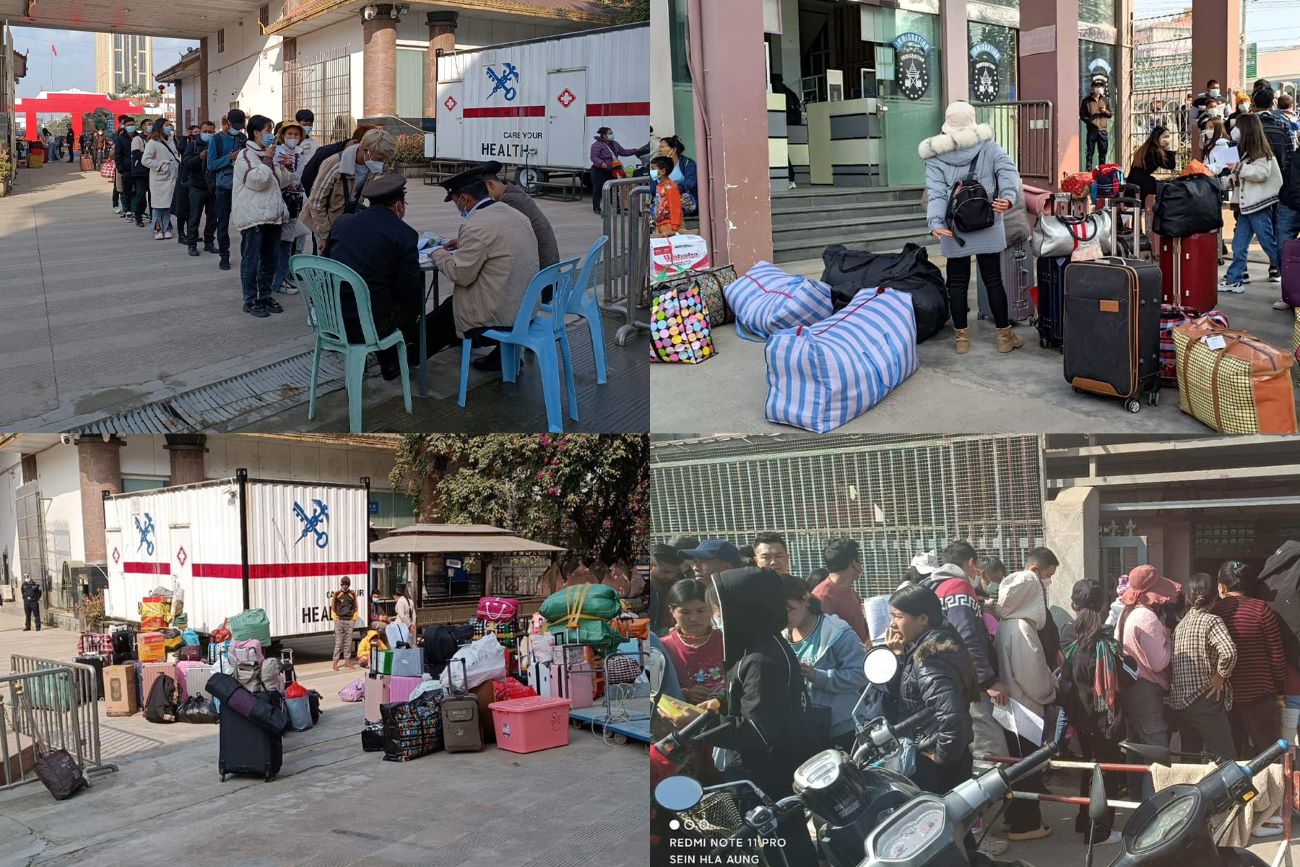
- By CNI
- Category: English Section
- Hits: 682
CNI News
16 Mar 2023
Myanmar nationals in China have been forced to pay more than Yuan 2,000 (over MMK 800,000) per person to agents to return home illegally, charities in Muse told the CNI.
As Myanmar nationals working in China have been stranded there for almost three years due to the outbreak of COVID-19, authorities from the two countries have been taking measures to allow them to return home.
However, it takes more than one week or two weeks to return home through the process of the authorities, they are paying agent fees to return home illegally, Chairman U Htay of the Letkanku (Giving a Hand) Charity told the CNI.
U Htay told the CNI, "In some border areas, there are three to five layers of fences. However, in some places, they can pass the border from the water way and there are villages that lie on the borderline. A part of the villages is in the Myanmar territory and another part of them in the Chinese territory. In such villages, there are illegal routes made for various reasons. They are returning home through different ways and means. Some of them were arrested by Chinese police on illegal routes. Such people are jailed and put on the blacklist. They will be banned from working in China for five years.
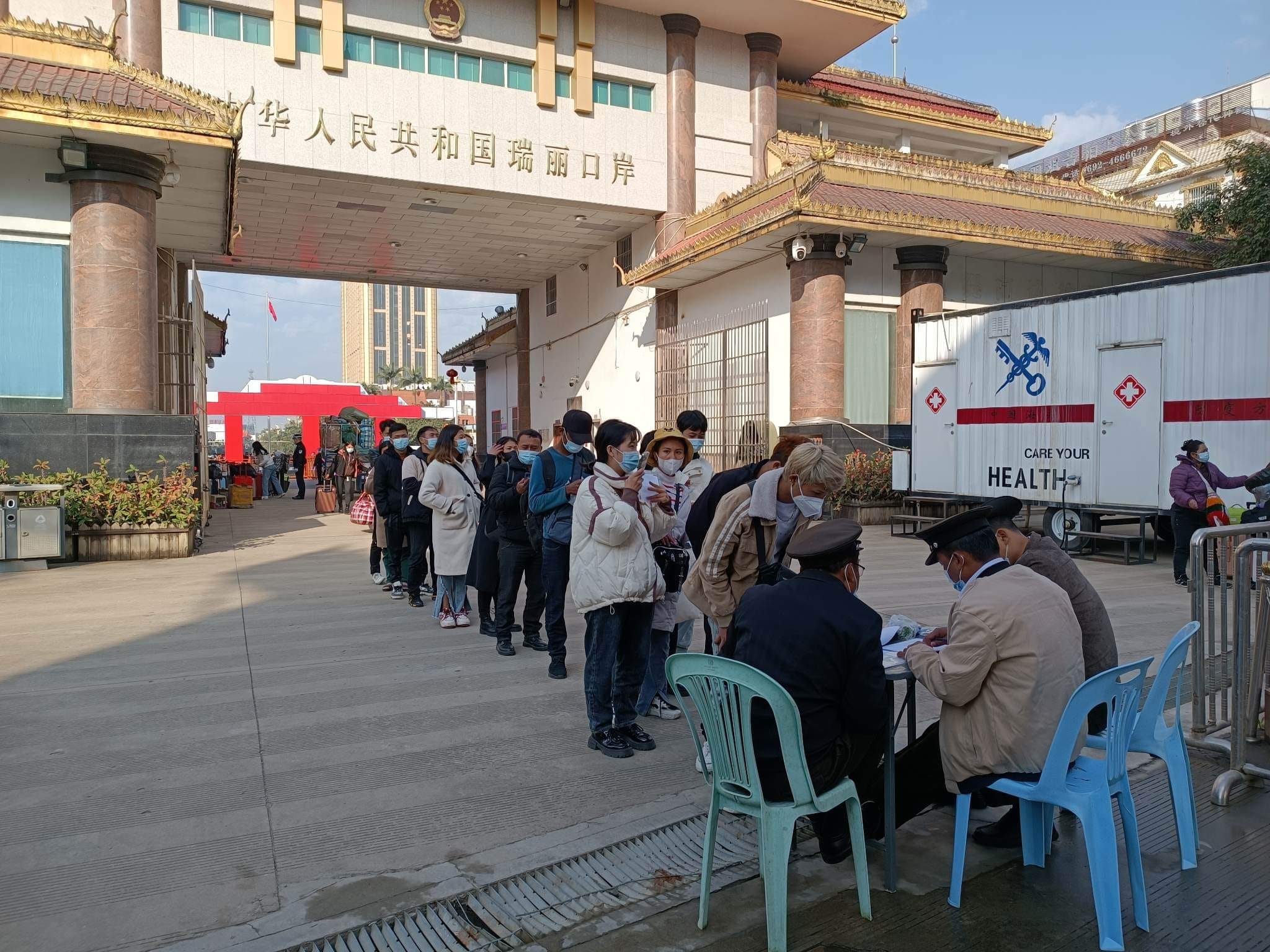
Scrutinizing Myanmar nationals who wanted to return home
Myanmar nationals in China who want to return home can contact the Myanmar Consulates in China and the Myanmar Embassy in Beijing while they can also submit application forms to the Assistance Association Myanmar Nationals in Ruili.
As they have been stranded in China during the lockdown, documents of some of them have expired and Chinese authorities jailed them for one year and fined each of them Yuan 1,000 or 500.
As the penalties are too severe, Myanmar authorities requested their counterparts not to take such action against Myanmar nationals. As a result, Chinese authorities have stopped sentencing Myanmar workers. However, they are still fined Yuan 150 and have to pay document fees of Yuan 150, totalling Yuan 250.
A few days ago, some Myanmar nationals who tried to return home illegally were cheated out of their money by their agents. Those who are married to Chinese nationals are required to submit the permission of their spouses.
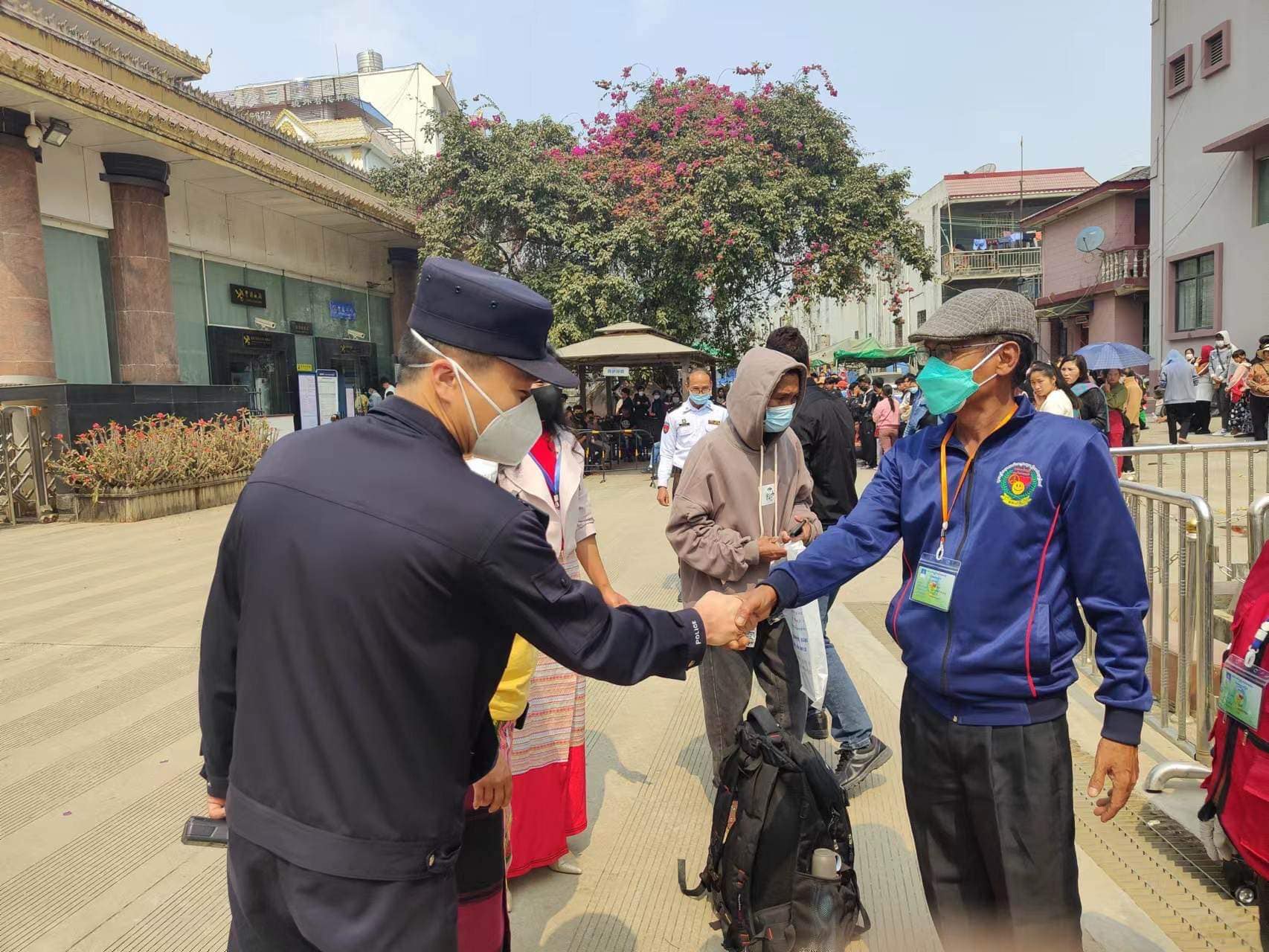
Scrutinizing Myanmar nationals who wanted to return home
As they have been stranded in China for three years, they should wait for a certain period of time patiently to return home legally, Chairman U Pho Htaung of Hnalone Hla (Beautiful Heart) Charity (Muse) told the CNI. He urged them not to return home illegally.
He told the CNI, "If they are arrested by authorities, we cannot help them. Whether a Myanmar national illegally enters China or returns home, they take severe action against them. Authorities first gather enough returnees to be repatriated to make the process easier. They are not delaying the process deliberately. One or two week is a very short period of time. We don't want to encourage them to return home illegally. If there is a problem, they will suffer huge losses."
At present, authorities are receiving Myanmar nationals who want to return home on Mondays, Wednesdays and Fridays and Chinese authorities are sending about 100 Myanmar nationals everyday.



